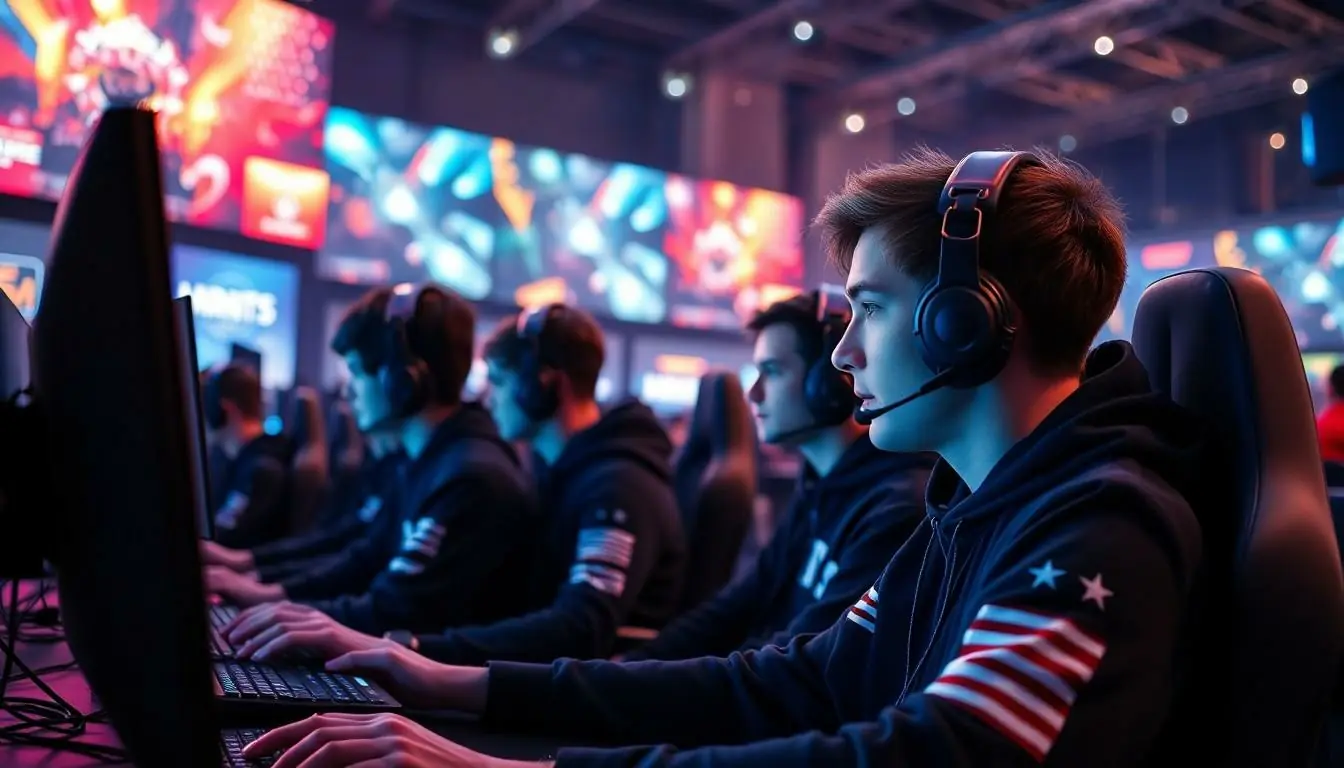Table of Contents
ToggleIn the fast-paced world of gaming, esports organizations are the unsung heroes, turning casual gamers into legends. These powerhouses not only cultivate talent but also create a thriving ecosystem where players can shine brighter than a thousand pixelated stars. With sponsorships, fan engagement, and jaw-dropping tournaments, these organizations are the backbone of a multi-billion dollar industry that’s here to stay.
Overview of Esports Organizations
Esports organizations play a pivotal role in the gaming industry, serving as the backbone for competitive gaming. They focus on nurturing talent, offering professional training, and creating pathways for gamers to excel. Sponsorships form a significant part of their operations, providing financial support that allows teams to compete at high levels.
They also engage with fans through various channels, enhancing community interaction and loyalty. Impressively organized tournaments showcase the skills of players, drawing in large audiences and elevating the reputation of the esports scene.
In recent years, the attractiveness of esports organizations has grown, with numerous franchises emerging across multiple games such as League of Legends, Dota 2, and Counter-Strike: Global Offensive. This expansion underscores the industry’s economic potential, generating billions in revenue annually.
Every organization brings a unique identity, often represented by team colors, branding, and player rosters that resonate with fans. The impact on the player experience is substantial, as they often gain access to resources and training facilities that enhance their skills.
Additionally, partnerships with established brands help foster a professional environment where gamers can thrive. Through these relationships, esports organizations secure necessary resources to improve player development and maintain a competitive edge.
The operations of these organizations extend beyond the gaming itself; community outreach and charitable initiatives highlight their commitment to social responsibility. Engaging in these activities showcases their dedication to using gaming as a vehicle for positive change, further solidifying their importance in the industry.
Types of Esports Organizations
Esports organizations come in various forms, each contributing uniquely to the gaming landscape. Understanding these types illustrates the diverse roles they play within the industry.
Professional Teams
Professional teams comprise skilled players competing in various esports titles. They often recruit talent through rigorous scouting processes and provide extensive training programs. These teams participate in high-stakes tournaments, striving for championship titles and substantial prize money. Additionally, they build strong brand identities, creating loyal fanbases and fostering community interaction. Organizations like Team Liquid and FaZe Clan exemplify the success and recognition professional teams can achieve through consistent performance.
Tournament Organizers
Tournament organizers manage competitive events, ensuring smooth execution and audience engagement. These entities facilitate everything from local qualifiers to major international championships. They secure sponsorships and partnerships to enhance prize pools and overall event production. Prominent examples include ESL and DreamHack, renowned for hosting some of the largest competitive gaming events globally. Engaging with players and fans alike, tournament organizers play a critical role in the esports ecosystem.
Sponsorship and Management Firms
Sponsorship and management firms connect brands with esports organizations and players. They negotiate sponsorship deals, helping teams secure vital funding and resources. These firms specialize in marketing strategies tailored to the gaming audience, maximizing visibility for both the organizations and their sponsors. Notable companies like Gfinity and Evolved Talent Agency provide representation and strategic guidance, targeting brand partnerships that resonate with esports consumers. Their expertise enhances the industry’s growth and supports player development and organizational success.
Impact of Esports Organizations
Esports organizations significantly shape the gaming landscape. Their influence extends beyond competition, connecting players and fans on multiple levels.
Community Engagement
Community engagement plays a vital role in esports organizations. Gamers participate in community-driven events, enhancing the overall experience. These organizations host fan meet-ups, online streams, and workshops, which strengthen player-fan relationships. Engagement efforts often include interactive content on social media platforms, fostering a sense of belonging. Various initiatives promote diversity and inclusivity, welcoming players from different backgrounds. By establishing grassroots programs, these organizations nurture upcoming talent, ensuring a bright future for competitive gaming.
Economic Influence
The economic influence of esports organizations is profound. Revenue generation reaches billions annually, driven by sponsorships, merchandise sales, and media rights. Established brands invest significantly in partnerships, recognizing the potential of targeting dedicated fanbases. Sponsorship agreements enhance prize pool amounts, attracting top-tier teams and talent to events. Job creation within the industry is another positive outcome, as a diverse range of roles emerges, from coaching staff to marketing professionals. Furthermore, esports organizations inspire local economies, drawing fans to venues and generating tourism opportunities during major tournaments.
Challenges Facing Esports Organizations
Esports organizations encounter numerous challenges as they navigate a rapidly evolving industry landscape. Sustainability and regulation stand out as two significant hurdles affecting their growth and stability.
Sustainability Issues
Sustainability remains a pressing concern for esports organizations. They rely on sponsorship revenue, which can fluctuate based on market trends and consumer interest. Organizational expenses, including player salaries and event hosting costs, can be significant. Maintaining profitability requires strategizing ways to enhance revenue streams without compromising brand integrity. Environmental considerations also play a role, as organizations strive to implement eco-friendly practices during events. Fans and players increasingly expect sustainability practices, prompting organizations to adopt greener policies and connect with eco-conscious audiences.
Regulatory Hurdles
Regulatory hurdles present additional challenges for esports organizations. Competing in various regions involves navigating differing legal requirements and gaming regulations. These regulations can impact team operations, player eligibility, and tournament structures. Compliance with gambling laws requires organizations to ensure transparency and fairness when managing sponsorships tied to betting platforms. Intellectual property rights often become contentious as organizations seek to protect their brand identities. Addressing these challenges demands cooperation between stakeholders and a proactive approach to evolving regulations in this dynamic industry.
Future Trends in Esports Organizations
Emerging technologies shape the future of esports organizations, enhancing spectating and player experiences. Virtual reality (VR) and augmented reality (AR) play significant roles, creating immersive environments that engage fans at a deeper level. Organizations adopting these technologies can attract more viewers and keep audiences entertained during live events.
Data analytics becomes increasingly vital for performance improvements and fan engagement. Organizations leveraging big data identify trends in gameplay and fan behavior, helping tailor strategies to meet audience preferences. Advanced insights allow teams to optimize training regimens, contributing to better overall performance in competitions.
Furthermore, stakeholder collaboration enhances the esports ecosystem. Partnerships among teams, brands, and content creators foster mutual growth, as organizations pool resources to amplify reach. This synergy strengthens the industry and empowers smaller organizations to thrive in a competitive landscape.
Sustainability initiatives gain importance within esports organizations. Many teams are exploring eco-friendly practices, responding to audience demand for environmental responsibility. Green initiatives can influence brand loyalty, making sustainability a crucial aspect of organizational strategy.
As the regulatory landscape evolves, organizations adapt to new legal frameworks. Compliance with international laws regarding gambling, broadcasting, and player welfare will challenge organizations. Staying informed about legislative changes ensures teams navigate these hurdles successfully.
Lastly, the rise of grassroots movements indicates a shift towards community-driven development. Supporting local talent and fostering inclusivity becomes essential for long-term growth. Esports organizations that prioritize community engagement create loyal fanbases and nurture the next generation of players.
Conclusion
Esports organizations are pivotal in shaping the future of competitive gaming. Their commitment to nurturing talent and fostering community engagement creates a dynamic environment where players can thrive. As the industry continues to evolve, these organizations face challenges but also embrace opportunities that drive growth and innovation.
By leveraging emerging technologies and focusing on sustainability, esports organizations can enhance fan experiences while remaining adaptable to regulatory changes. The emphasis on grassroots movements and inclusivity ensures that the next generation of players receives the support needed to succeed. With their unique identities and strong brand connections, esports organizations will remain at the forefront of this multi-billion dollar industry, continuing to captivate audiences worldwide.




